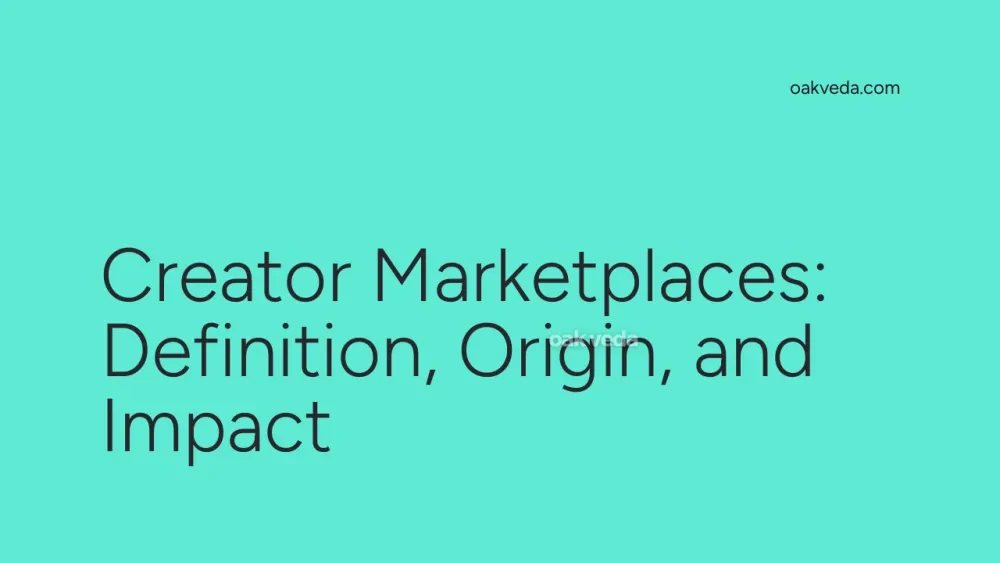
What are Creator Marketplaces?
Creator marketplaces are centralized platforms that connect content creators with brands seeking collaborations. These digital hubs serve as a meeting ground for influencers, brand ambassadors, and industry experts looking to partner with companies for promotional campaigns. By streamlining the process of finding and vetting potential collaborators, creator marketplaces have become an integral part of the influencer marketing ecosystem.
Origin and Development of Creator Marketplaces
The concept of creator marketplaces emerged as a response to the growing influencer marketing industry. As social media platforms gained popularity and individual creators amassed significant followings, brands recognized the potential of partnering with these influencers to reach their target audiences. However, the process of finding suitable creators and negotiating partnerships was often time-consuming and inefficient.
Creator marketplaces evolved to address these challenges, offering a structured environment where brands and creators could connect more easily. The development of these platforms has been closely tied to the rise of the creator economy, which has seen exponential growth in recent years.
How Creator Marketplaces Work
Creator marketplaces function as intermediaries, facilitating connections between brands and content creators. Here's a typical workflow:
-
Creator Registration: Influencers and content creators sign up for the marketplace, creating profiles that showcase their niche, audience demographics, and engagement rates.
-
Brand Campaign Creation: Brands publish their campaign requirements, including objectives, target audience, and budget.
-
Matching Process: The platform's algorithm matches suitable creators with brand campaigns based on various factors such as audience alignment and past performance.
-
Collaboration Initiation: Brands can review creator profiles and reach out to those they're interested in working with.
-
Negotiation and Execution: Once a match is made, the platform often facilitates the negotiation process and helps manage the collaboration from start to finish.
-
Performance Tracking: Many marketplaces offer analytics tools to track the success of campaigns and measure ROI.
Popular Examples of Creator Marketplaces
Several major social media platforms and independent companies have launched their own creator marketplaces:
- Instagram Creator Marketplace: Allows brands to discover and reach out to creators directly within the app.
- TikTok Creator Marketplace: Provides brands with access to TikTok's top creators and detailed analytics.
- YouTube BrandConnect: Connects brands with YouTube creators for various collaboration opportunities.
- Snapchat's Creator Marketplace: Focuses on connecting brands with AR lens creators and influencers.
- Later's Creator Marketplace: An independent platform that pairs creators with brands across multiple social media channels.
Impact of Creator Marketplaces on Social Media Culture
Creator marketplaces have significantly impacted social media culture in several ways:
-
Democratization of Influencer Marketing: By providing a level playing field, these platforms have made it easier for micro and nano-influencers to connect with brands, diversifying the influencer landscape.
-
Professionalization of Content Creation: The structured nature of these marketplaces has encouraged creators to approach their work more professionally, often leading to higher-quality content.
-
Transparency in Collaborations: Many marketplaces provide clear pricing structures and performance metrics, increasing transparency in influencer marketing.
-
Niche Targeting: Brands can now easily find creators in specific niches, allowing for more targeted and authentic marketing campaigns.
How Brands and Influencers Use Creator Marketplaces
For Brands:
- Discover new talent aligned with their target audience
- Streamline the process of vetting and selecting creators
- Manage multiple collaborations through a single platform
- Access performance analytics to measure campaign success
For Influencers:
- Increase visibility to potential brand partners
- Diversify income streams through various collaborations
- Professionalize their approach to brand partnerships
- Gain insights into their performance and market value
Future Trends Related to Creator Marketplaces
As the creator economy continues to evolve, several trends are shaping the future of creator marketplaces:
-
AI-Powered Matching: Advanced algorithms will improve the accuracy of creator-brand matches, considering factors like brand values and creator authenticity.
-
Blockchain Integration: Some marketplaces may adopt blockchain technology to ensure transparent transactions and protect intellectual property rights.
-
Cross-Platform Collaborations: Expect to see more marketplaces that facilitate collaborations across multiple social media platforms simultaneously.
-
Specialization: Niche-specific marketplaces may emerge, catering to particular industries or content types.
-
Enhanced Analytics: More sophisticated performance tracking tools will provide deeper insights into campaign effectiveness and ROI.
FAQs about Creator Marketplaces
Q: Are creator marketplaces free to use? A: It varies. Some platforms are free for creators but charge brands a fee, while others may have subscription models or take a percentage of the collaboration fee.
Q: Can small businesses benefit from creator marketplaces? A: Absolutely. Many marketplaces cater to businesses of all sizes, allowing small brands to connect with micro-influencers who may be more aligned with their budget and target audience.
Q: How do creator marketplaces ensure authenticity? A: Most platforms have vetting processes in place, checking creators' follower counts, engagement rates, and content quality. Some also use AI to detect fake followers or engagement.
Q: Can creators join multiple marketplaces? A: Generally, yes. However, it's important to check the terms of service for each platform, as some may have exclusivity clauses.
Creator marketplaces have revolutionized the way brands and influencers collaborate, making the process more efficient, transparent, and accessible. As they continue to evolve, these platforms will play an increasingly crucial role in shaping the future of influencer marketing and the creator economy at large.
You may be interested in:
- Cap: Definition, Origin, and Impact on Social Media
- Highkey: Definition, Origin, and Impact on Social Media
- Flop Era: Definition, Origin, and Impact on Social Media
- Flex: Definition, Origin, and Impact on Social Media
- Share of Voice (SOV): Definition, Origin, and Impact
- AMA (Ask Me Anything): Definition, Origin, and Impact

